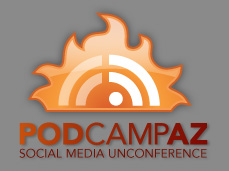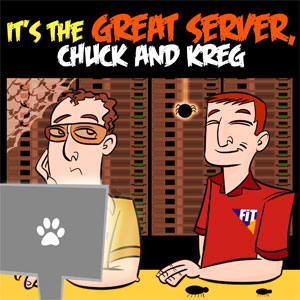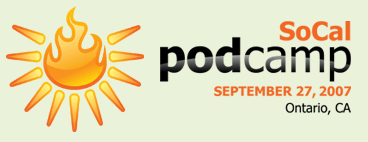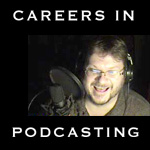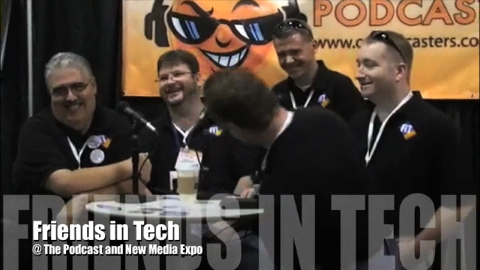Over the last three years I have been involved in several podcasting “networks” of various types and I spent quite a bit of time at the last Podcasting and New Media Expo discussing them with a variety of people. Thinking back over my experiences I see now that podcast networks are an anachronism…a concept meant for another age and another technology. I have often said that in podcasting, we need to take the best of the television and radio business and leave the rest behind. I think the concept of “broadcast networks” should be left on the scrap pile and new concepts should be developed that better reflect the realities of podcasting and new media.
Podcast networks sprung up over the last several years to fill one particular need. It was thought that by collecting a quorum of quality shows, these networks would be able to negotiate advertising deals and then this revenue could be shared among the members of the network. In some small ways, this has worked. I have made several hundred dollars over the years from networks such as these, but I think there are some significant issues that limit their effectiveness. In fact, I think we, as new media producers are suffering from a great lack of vision.
New media, new world
First, unlike traditional television and radio, podcasting offers diversity never before seen. Even within genres, the shows vary wildly in content, tone and quality. Today, we are engaged in the great “nichification” of entertainment and any attempt to apply traditional ideas of mass market advertising is doomed to failure. The world has changed and advertising needs to change with it.
Next, one large effect of applying these traditional advertising methods to podcasting is the producer’s loss of control over the content of their show. I am not talking about copyright issues or stealing content, rather I am talking about the inability for producers to decide what advertisements appear in their shows.
During the Podcast and New Media Expo, I spoke with several network-related people. To each of them I posed the questions, ‘What if I don’t want to run a particular network advertisement?” Almost universally, I was met with roadblocks. Any attempt to control advertising content in my show was said to jeopardize their attempts to sell network-wide advertising. I had to give up my control, so they could do their deals. For me, this is simply unacceptable and an artifact of applying old ideas to new media.
Producers must have the right and ability to opt-in or opt-out of any particular advertisement or any particular advertiser or they run the risk of losing their audience. I know for certain that running the wrong type of ad in my podcast could significant damage my audience. To enter into any network that has no opt-out policy, or frowns on opt-out, would be working against my own best interests.
The fact is, there are three sides to the advertising equation and all need to be given equal respect in the process. First, the advertiser supposedly knows what types of ads are most adept at selling their products, the podcast network supposedly knows which shows would be the best fit for any given campaign, but only the producer knows what is right for their audience. If any one of these elements tries to override the other, the system falls apart. As I often explain to advertisers and network people I talk with, “If I take an advertisement that destroys my show, you have fewer add impressions to sell and we both end up losing.” Of course, the producer has much more at stake. The network might lose one show of many, but the producer has lost their only, once successful property. The risk is not equally shared.
Technology, not networks
So, if not podcasting networks, then what. Technology opened up this new entertainment horizon for us and it can provide the answer for advertising across individual podcasts without the need for networks.
Instead of expending all this effort developing networks and acting as the middleman between advertisers and producers, we need to expend time, energy and money on creating an open advertising marketplace where individual producers and individual advertisers can match needs. We have the skills and we have the technology and, I believe, someone could make a great deal of money facilitating these advertising transactions, rather than trying to work traditional advertising deals in a new media market.
The basics of such an advertising market would allow individual podcasters to report their demographics in an industry-standard way into the system, listing subscriber numbers, age, sex, income, etc. Advertisers would then be able to place an “ad buy” into the system using this demographic data across the entire new media realm instead of trying to deal with thousands of individual producers or hundreds of podcast network salespeople. Producers, conversely, would have the ability to accept or decline any ad buy request based on the nature of the ad or the terms of payment. This allows advertisers to make the best use of their advertising dollars by targeting their ads more closely to a niche and allows the producers to make decisions about what is best for their shows. Each party has a level of control that protects their message.
In fact, the Feedburner Ad Network provides part of this model right now. Feedburner collects advertisers and their individual ads. As a content provider, I am then presented with an ad, in all its forms, and can make a one-click decision to Approve or Decline it — no recriminations from the network — no pressure to run an ad for a product or company that I feel doesn’t meet my listeners/readers needs or worse, insults them. I think a system like this, expanded to audio and video advertising would be a great place to start.
Creating an open market for new media advertising would best serve the needs of everyone involved and help to turn new media into a more legitimate market for advertisers. As a new media producer I neither want, nor need, a middle man between me and my advertisers. I need to deal with advertisers directly through an open market so that both they and I can succeed in this new media world.
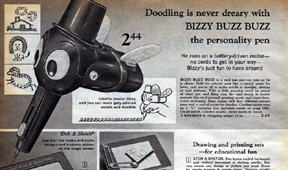
 Date: Sat, October 27, 2007
Date: Sat, October 27, 2007